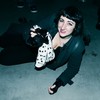
Advertisement
Ruslana: My music was changing because I was changing myself. I started my music career as romantic girl who was waiting for the spring. But I found the unique culture of the Carpathian Mountains and the Hutsul people who are living there. It was my new beginning as a folk singer. I never thought that it would be such a big success with Wild Dances all over the world. Ten years have passed since my win in the Eurovision Song Contest, but a few months of the Ukrainian revolution have changed me and all Ukrainians more than these ten years. I don’t feel ready to produce new albums or singles now. Today, I am person who would like to protect the Ukrainian image by public events and speeches. Today I am not ready to sing and dance, even if my dance is wild and brave.
Advertisement
Maybe I will restart my concerts in a few months. Today, I have a lot of international visits related to the situation in Ukraine. I have already visited Brussels, Strasbourg, Warsaw, Stockholm, Vienna, Berlin, Munich, and Washington, DC, and I have a chance to talk true about Ukraine and hope for international support. I will go to Paris in a few days, and after that I will visit New York to participate in the Women in the World summit. In the end of April, I will go to São Paulo and will give a speech at a TEDx event. And finally I have one more ceremony at the Atlantic Council in Washington. As you can see, my schedule is so hard now that I haven’t a possibility to perform as a singer.Are there any traditional Ukrainian songs you really connect with?
Yes, I have a song called "Arkan." This is an ancient Hutsul dance in which people are whirling with a great speed. I feel a special energy when I am singing the melody of "Arkan," and I always ask people to dance and sing together with me.

I must note that Ruslana, before the protests and after the protests, is different. I changed, and my music will change as well as me. I can imagine my new singles as a march of Ukrainian victory and independence. A lot of people are sending their own songs about Ukraine to me. Maybe I really will record something patriotic. I have an idea to perform the same song in different languages as Ukrainian, Russian, English, German, French, even Chinese. But it is only an idea.
Advertisement
Unfortunately, I have no time for music now, and I am very worried about it. Music is the main part of me, and I am coming short of it.You’ve recorded with Missy Elliott and T-Pain. Do you have any collaborators in mind for the future?
Maybe I will record a music duet with some Chinese singers, because I would like to visit China in the summer and I’m really thinking about such collaboration.How does it feel to represent your country at this moment, especially with the International Women of Courage award?
It's a great honor and responsibility for me to represent Ukraine in such a decisive moment. I understand that I must do my best for my country and Ukraine.If you are the voice of Ukraine, do you think the same message can be delivered through both music and social movement?
I think that music is a connecting link for people anytime. We sing when we are happy and lucky, and we also sing when we are in trouble. But it’s important to understand that there is a very thin dividing line between our troubles. When people die from bullets, as we saw in the Maidan, it’s better to listen to the silence instead of music and try to join people by speeches and prayers.Follow Nadja Sayej on Twitter.
